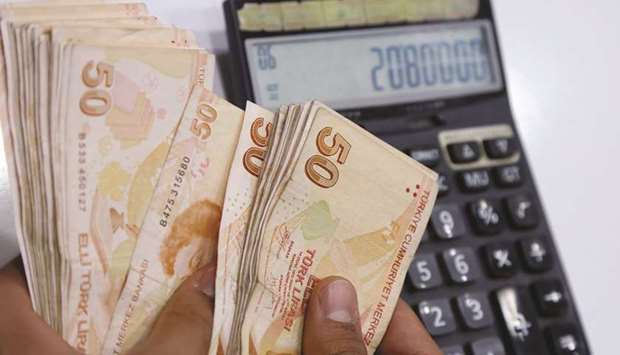Turkish President Recep Tayyip Erdogan signed off on a proposed 2019 budget that promises to help the Middle East’s largest economy regain balance and financial stability while curbing consumer inflation.
Expenditures and income are both expected to rise by about 25% from this year, keeping the annual deficit at just over 80bn liras ($14.4bn), the government said in a proposal drafted by the office of the president and sent to the parliament’s Planning and Budget Committee yesterday. The shortfall would be just under 2% of Turkey’s $880bn gross domestic output.
“Restoring price and financial stability in the near term” is the budget’s objective, the government said in the document. “Economic balancing and budget discipline” are also among its priorities, according to the proposal.
With the economy slowing down after years of supercharged credit growth, policy makers now need to deliver on pledges of greater budget discipline in an attempt to placate investors after a bout of financial turmoil that began in August. The proposal is a sign that Turkey is finally looking to rein in public expenditures and refrain from creating another lending boom driven by Treasury guarantees, which is necessary to restore at least some of the policy credibility lost during the past few months.
The lira gained for a 10th day and was trading 0.3% higher at 5.5706 per dollar at 3.54pm in Istanbul yesterday.
With consumer inflation seen at 17% a year from now in a central bank survey published yesterday, the budget deficit projected for 2019 shows almost no expansion when adjusted for price gains. Under the latest official estimates, the government’s shortfall is set to reach 72.1bn liras at the end of this year.
The government first signalled plans to keep the deficit somewhat flat in real terms in a medium-term programme unveiled last month, setting out targets that investors found more realistic than ambitious.
One major departure from this year’s budget is the amount of special-purpose bonds that the government can issue, which was increased from 1% of expenditures to 3%, or around 28.5bn liras.
Such securities can be used by the government to provide capital for state banks and other state agencies, according to the proposal. By definition, they can’t be resold in the secondary market.
The parliamentary subcommittee has scheduled the general budget presentation for October 23, and ministries will answer questions from lawmakers in individual sessions starting a week later. The hearing will come to an end on November 22, with a general vote on the bill likely in December.

A money changer counts Turkish lira banknotes at a currency exchange office in Diyarbakir, Turkey. The currency gained for a 10th day and was trading 0.3% higher at 5.5706 per dollar at 3.54pm in Istanbul yesterday.
